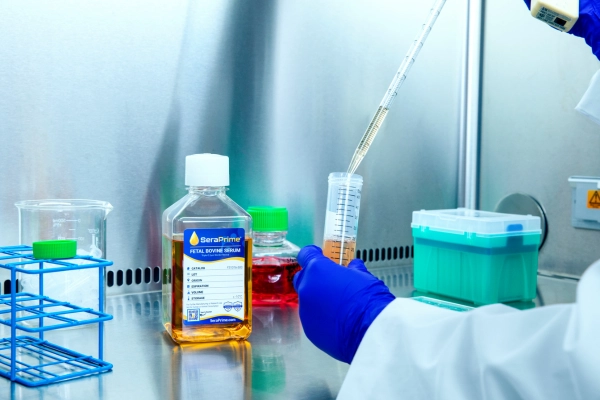Fetal Bovine Serum (FBS) has long been the cornerstone of cell culture research, praised for its consistent results and reliable supply. Recently, Human Platelet Lysate (hPL) has emerged as a potential alternative, promising similar benefits with a human-derived source. However, while hPL is touted as a substitute, it carries its own set of challenges and limitations. This blog will delve into the downsides of hPL, offering a clear comparison with high-quality FBS to help you choose the right serum for your research needs.
Limitations of Human Platelet Lysate
As a potential alternative to FBS, hPL has garnered interest due to ethical concerns with its acquisition and the quest for more defined serum components. However, there are several significant drawbacks of hPL use in research and cell culture.
- Variability in Composition: Unlike FBS, which has a relatively consistent profile, hPL can vary widely depending on the individual platelet units used. Each donation may have different levels of growth factors, cytokines, and nutrients, leading to inconsistencies in experimental outcomes. This variability can complicate research efforts and affect reproducibility.
- Limited Commercial Availability: One of the challenges with hPL is its limited availability on the market. The production of hPL is not as widespread as FBS, partly due to the complex and costly process involved to manufacture it. Additionally, the ethical considerations surrounding the use of human-derived products further limit its commercialization, making it less accessible for many researchers.
- Potential for Immunological Reactions: Although hPL is less likely to provoke immunological reactions compared to FBS, there is still a risk, particularly in allogeneic settings where the source of the hPL is from a different individual. Such reactions, while less common, can still impact the efficacy and safety of cell cultures.
- Risk of Disease Transmission: hPL, being a human-derived product, carries the risk of transmitting infectious diseases such as HIV, hepatitis B and C, syphilis, human T-lymphotropic virus, and cytomegalovirus. Although all blood products are rigorously tested, the risk is not entirely eliminated. Additionally, hPL may harbor mycoplasma contamination, which is not routinely tested but can adversely affect cell cultures.
- Practicality and Feasibility: To mitigate the risks associated with disease transmission, hPL must undergo rigorous testing and quarantine procedures. This involves reanalyzing the donor after a few months for potential serum conversions. However, these additional steps are often impractical in routine research settings due to the time and cost involved.
Comparing Fetal Bovine Serum and Human Platelet Lysate
For cell culture, both FBS and hPL have advantages and limitations, but FBS has long been the gold standard in cell culture due to several key benefits that hPL struggles to match.
1. Consistency and Reliability: FBS is renowned for its consistent composition, which is crucial for reproducible research results. It provides a well-defined mix of growth factors, hormones, and nutrients that support robust cell growth and proliferation. This consistency is vital for experimental accuracy and reliability, making FBS a trusted choice for many researchers.
2. Established Safety and Efficacy: FBS has been extensively tested and used in various research applications for decades. Its safety profile and effectiveness in promoting cell growth are well-documented. Although FBS is not without its ethical concerns, its proven track record offers reassurance to researchers about its efficacy in supporting a wide range of cell types.
3. Broad Availability: FBS is widely available from numerous suppliers, ensuring researchers have consistent access to this essential resource. The established infrastructure for producing and distributing FBS means it is readily obtainable, which is not always the case for hPL. This availability is particularly advantageous for maintaining ongoing research projects without interruption.
4. Comprehensive Testing and Quality Control: The production of FBS involves rigorous testing for contaminants and diseases, ensuring a high level of safety and purity. Quality control measures are well-established, providing confidence that the serum used in research meets stringent standards. This level of testing is less commonly applied to hPL, which can lead to concerns about contamination and variability.
5. Ethical Considerations: FBS’s production and use are governed by established guidelines and regulations. In fact, SeraPrime goes above and beyond to ensure the ethical treatment of animals by only working with USDA-inspected and established facilities in the U.S. and USDA-approved countries when sourcing internationally. In contrast, hPL, derived from human blood, introduces additional ethical issues and complexities, including consent and potential health risks to donors. The established ethical framework surrounding FBS is more straightforward compared to the evolving considerations with hPL.
Maintain High Quality, Safe Research with SeraPrime
Choosing the right supplement for cell culture is crucial for the success of research and development projects. While hPL presents some potential benefits, its limitations in consistency, availability, and safety often overshadow its advantages compared to FBS. FBS remains the gold standard due to its reliability, extensive testing, and established safety profile.For researchers seeking dependable and high-quality cell culture solutions, FBS continues to be the preferred choice. At SeraPrime, we are committed to providing top-tier FBS that meets the highest industry standards. If you’re ready to ensure your research benefits from the best possible resources, contact us today to learn more about our premium FBS offerings and how we can support your scientific endeavors.

